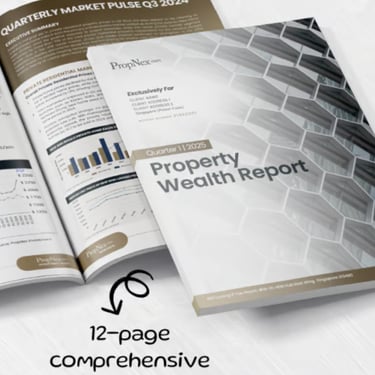Ask the Experts : Singapore Property Market Outlook 2025 - Why Delaying Could Mean Missing Out
Discover the Singapore Property Market Outlook for 2025. Is now the right time to invest? Uncover surprising insights and expert predictions that could shape your real estate strategy. Don't miss the exclusive videos revealing the economic trends and opportunities ahead!
ASK THE EXPERTSMARKET UPDATES
1/1/20253 min read
Setting the Stage for Singapore's Property Outlook in 2025
As we look ahead to 2025, the Singapore property market presents a promising landscape, supported by positive economic indicators such as robust GDP growth and stable employment rates. Based on the experts' insights, now is an opportune time to consider property investment. This blog aims to provide a sincere and appreciative perspective on why now might be the best time to enter the market, guided by the experts' observations.
The Speaker's Perspective on Interest Rates and Market Timing
Interest rates play a pivotal role in shaping market dynamics. The speaker emphasized that while many investors await a drop in interest rates before entering the market, this strategy can be fraught with risks. Historically, when rates do decrease, demand surges, often leading to a rapid increase in property prices. This scenario can make it more challenging to enter the market affordably, as the cost of properties escalates.
Why Waiting for Lower Interest Rates Might Not Be the Best Strategy
The speaker highlighted the potential pitfalls of waiting for interest rates to drop. When rates do decrease, the resulting surge in demand can create a FOMO (Fear Of Missing Out) environment, where property prices rise rapidly. This can lead to irrational decision-making, as investors rush to secure properties at inflated prices. By entering the market now, investors can avoid the uncertainty and potential overvaluation that may accompany a rate drop.
How FOMO Drives Property Prices Up
Sentiment-Driven Market
The property market is heavily influenced by sentiment. When interest rates drop or economic conditions improve, optimism grows. This positive sentiment can trigger a wave of buyers entering the market, driven by the fear of missing out on potential gains. As more buyers compete for limited properties, demand increases, pushing prices upward.Increased Demand
FOMO often leads to a surge in demand. When buyers see others rushing to purchase properties, they feel pressured to act quickly to avoid being left behind. This heightened demand creates competition among buyers, which can drive up property prices, especially in popular or desirable locations.Developers and Sellers Adjust Pricing
When demand rises due to FOMO, developers and sellers may become less sensitive to pricing. They recognize that buyers are willing to pay more to secure a property, and they may increase prices accordingly. This further fuels the upward trend in property values.Perception of Scarcity
FOMO is often tied to the perception of scarcity. When buyers believe that properties are limited or that prices will continue to rise, they are more likely to act quickly and pay higher prices. This perception can become a self-fulfilling prophecy, as increased buying activity reduces available inventory and drives prices even higher.Emotional Decision-Making
FOMO is rooted in emotions, particularly fear and anxiety about missing out on opportunities. When buyers make decisions based on emotions rather than rational analysis, they may overpay for properties or rush into purchases without fully considering the long-term implications. This behavior contributes to price inflation in the market.
Why This Matters for Investors
Understanding the role of FOMO in driving property prices is crucial for making informed investment decisions. By entering the market before FOMO takes hold, investors can avoid the inflated prices and heightened competition that often accompany a surge in demand. This approach allows for more strategic and cost-effective property purchases.
The Power of Asset Investment Over Traditional Savings
Experts underscore the importance of using income to invest in assets like property, rather than relying solely on savings. With the average salary in Singapore, saving $1.1 million over ten years is unrealistic for most individuals. Property investment offers a way to make your income work harder for you, helping to build wealth over time. This approach ensures that your money is actively generating value rather than sitting idle.
Navigating FOMO and Emotional Decision-Making in Property Investment
Investing in property is not just a financial decision; it is also an emotional one. The speaker cautioned against letting emotions, particularly FOMO, dictate investment choices. By understanding market dynamics and focusing on long-term goals, investors can make more rational and confident decisions, avoiding the pitfalls of emotional investing.
Conclusion: Why Now is the Optimal Time to Enter the Singapore Property Market
In conclusion, the speaker's insights paint a compelling picture of why now is the optimal time to enter Singapore's property market. By considering the positive outlook for 2025, understanding the risks of waiting for lower interest rates, and recognizing the power of asset investment over traditional savings, investors can position themselves for success.
This blog aims to provide valuable information and encouragement, empowering readers to make informed decisions and seize the opportunities presented by the current market.

Video not loading? Try refresh the webpage.


Property Wealth Report (PWR)
Available exclusively to my clients.
PropNex Realty Pte Ltd (Licence No: L3008022J)
480 Lorong 6 Toa Payoh #10-01 HDB Hub East Wing Singapore 310480




